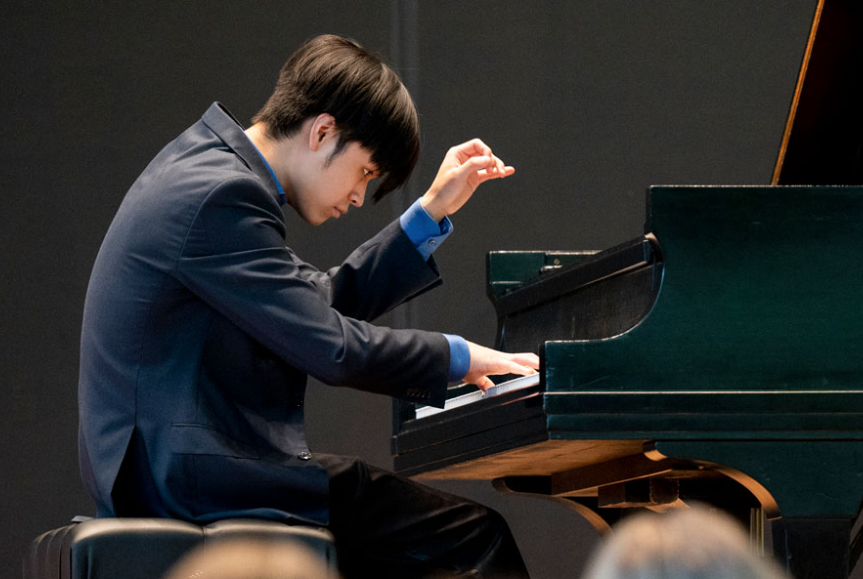
Sunday, July 30, 2023
2:30PM
Amphitheater
The Chautauqua School of Music Piano Program presents a gala concert of piano music inspired by Chautauqua's theme for week six: A Life of Literature. A selection of virtuosic young pianists will present a kaleidoscope of brilliant and thought-provoking music by composers who were influenced by literature or writers, and works written in response to extra-musical inspiration. The program includes works by luminaries such as Schumann, Gershwin, Debussy, and Chopin. This showcase is an event not to be missed!
The Festival Schools Piano Program presents music in response to Chautauqua’s week six theme: A Life of Literature. Many composers are inspired by writers, by literature, narrative, poetry, librettists--the written word in its many forms. Robert Schumann, dear friend to many great writers, encodes words and depictions of friends--real and imaginary--in his works. The title of Debussy’s Ce qu'a vu le vent d'ouest (What the west wind saw) was inspired by "The Garden of Paradise", a fairy tale by Hans Christian Andersen, and we will hear an excerpt from Chopin’s "Là ci darem la mano" variations, based on a duet sung by Don Giovanni and Zerlina in Mozart's Don Giovanni. The great American songs of George Gershwin are often transcribed for instruments only, yet we still hear Ira’s familiar words echoing as we listen to those beloved melodies. Even Brahms, a composer not usually associated with programmatic music, included a Ballade in his Klavierstücke Op. 118.The program expands to include pieces with other extra-musical influences. The evocative études of Frédéric Chopin have acquired nicknames over time: “Aeolian Harp” and “Winter Wind” are two of the most commonly used, the first creating the image of an aeolian harp activated by gentle wafting breezes, the second a colder, icy, turbulent wind. Many composers are inspired by visual stimuli: Los requiebros (The compliments) is from “Goyescas”, a set of pieces that pays homage to the work of painter Francisco Goya, and Rachmaninoff’s glorious études-tableaux are intended to be "musical evocations of external visual stimuli". Then there is the nostalgia of place: Debussy’s prelude in the style of a habanera, La puerta del Vino (the wine gate), is inspired by the Moorish Alhambra Palace in Grenada, Spain. In Musica Nara, Japanese composer Minako Tokuyama conjures Japan’s ancient capital of Nara with her palette of cultural motifs that bridge the past and present.
Sonata No. 2 in B-flat minor, Op. 36
III. Allegro molto
Sergei Rachmaninoff (1873-1943)
Andrew Chen
Two Klavierstücke, Op. 118
I. Intermezzo in A minor
III. Ballade in G minor
Johannes Brahms (1833-1897)
Chelsea Ahn
Two Etudes, Op. 25
No. 1. “Aeolian Harp”
No. 11. “Winter Wind”
Frédéric Chopin (1810-1849)
Peizhang Wu
Musica Nara, Op. 25
Minako Tokuyama (b. 1958)
Sean Yang
Two Préludes:
La puerta del Vino (The Wine Gate)
Ce qu'a vu le vent d'ouest (What The West Wind Saw)
Claude Debussy (1862-1918)
Alexander Tsereteli
*The Man I Love
*They All Laughed
George Gershwin (1898-1937) arr. Logan Skelton
Eric Yu
Sean Yang
* This presentation of Gershwin arrangements is a test performance in collaboration with the George and Ira Gershwin Critical Edition.
Goyescas: I. Los requiebros (The Compliments)
Enrique Granados (1867-1916)
Saehyun Park
"Variations on “La ci darem la mano”: Theme--alla Polacca
Frédéric Chopin (1810-1849)
Zhenyi Long
Carnaval Op. 9: Préambule
Robert Schumann (1810-1856)
Grace Tubbs
Images Book I
III. Mouvement
Claude Debussy (1862-1918)
Vanessa Yu
Two Etudes-Tableaux, Op. 39
No. 1. Allegro agitato.
No. 9. Allegro moderato. Tempo di marcia
Sergei Rachmaninoff (1873-1943)
Gabriel Landstedt
Variations on "I Got Rhythm"
George Gershwin (1898-1937)
Dongwon Shin
HaEun Yang